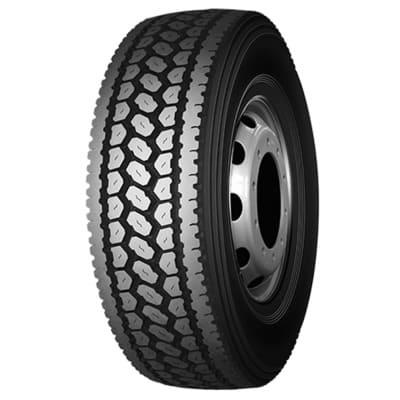CROCOTIRE Tire is a Chinese brand manufacturer, devoted to tire pattern design and developing new tire products. We stay small and sell big. CROCOTIRE is able to provide one-stop tire solutions.
If you are in the market for truck tires, this article is for you. In this post, we will cover the basics of truck tires- what they are, how to read their model number, and the different types of truck tires available. We will also discuss world-famous brands and the certification process for truck tires. So whether you are a first-time buyer or just looking to learn more about truck tires, keep reading!
- Raw Materials for Making Truck Tires
- How to Produce Truck Tires?
- How to read the model number of a truck tire?
- What are the different types of truck tires?
- Radial Truck Tires Type by Special Applications
- Nylon Truck Tires Type by Special Applications
- What Certificates Truck Tires have?
- Truck Tire Brands
- Truck Tire Sizes for Different Market
- Truck Tire Size & Rim Size Comparison Table
Raw Materials for Making Truck Tires
The main raw materials of making truck tires are rubber, steel, and carbon black.
Rubber makes 44%, with both natural rubber and synthetic rubber. Its the main component of a tire. The nice natural rubber, for example, is Thai 1#, 20# mixed rubber, or Vietnamese natural rubber. Synthetic rubber includes, such as butadiene and butylbenzene.
Steel material accounts for about 24%, including steel cord, polyester cord, sensible nylon ingredients, which provides strength and structure to the tire;
Carbon black makes up 23%, which gives the tire its black color and also reinforces the tread. The better brands are Cabot, O’Reilly Long, Bora, Lonestar, Black Cat;
And various chemicals and compounding ingredients make up for the remaining 9%, which help to vulcanize the rubber (i.e., make it stronger and more durable) and give the tire other desired properties.

How to Produce Truck Tires?
The production process of truck tires begins with the raw materials being mixed together. The mixture is then placed into a mold where it is vulcanized, or cured. After vulcanization, the tire is cooled and then inspected for any defects. Once the tire passes inspection, it is then ready to be shipped to the customer.
The entire process from start to finish usually takes about six weeks. However, it can vary depending on the specific type of tire being produced and the number of orders that the company has. For instance, if a company is producing a large order of tires, it may take short time to complete the production process. On the other hand, if a company is producing a small order of tires, it may complete the process in a longer amount of time. Because continuous production will save time without changing the molds.
Regardless of the size of the order, the production process of truck tires is an essential part of the tire manufacturing process.

How to Read the Size Number of a Truck Tire?
The model number of a truck tire is very important. It tells the buyer what size tire they need. The model number is always on the sidewall of the tire. It is usually in raised lettering or embossed into the sidewall. Sometimes it is on a sticker on the tire pattern.
The size will start with a number. This number is the width of the tire in millimeters. The next number is the height of the sidewall as a percentage of the width. The last number is the diameter of the wheel in inches.
width of the tire in millimeters
height of the sidewall as a percentage of the width
diameter of the wheel in inches
For example, a model number that starts with “315” would be a 315 millimeter wide tire with a sidewall height of 80% of the width. The wheel would be 22.5 inches in diameter.
A model number that starts with “295” would be a 295 millimeter wide tire with a sidewall height of 75% of the width. The wheel would be 22.5 inches in diameter.
There are also a few other letters and numbers following the size that indicate the type of tire it is. For example, an “R” after the size means it is a radial tire, and “-” means it is a bias or nylon tire.

What Are the Different Types of Truck Tires?
(A) Tube Tire VS. Tubeless Tire
Tube tires are another type of truck tire that is designed for off-road use. Tube tires have a tube inside them that helps to protect the tire from punctures. They are also very durable and provide excellent traction.
Size for example, 1400R20 1200R20 1100R20 1000R20 900R20 750R16 700R16 etc.
The last type of truck tire is the tubeless tire. Tubeless tires do not have a tube inside them and are designed for use on paved roads. They provide a smooth ride and are very durable. However, they can be more susceptible to punctures than other types of tires.
Size for example, 425/65R22.5 385/65R22.5 315/80R22.5 295/80R22.5 295/75R22.5 275/70R22.5 11R22.5 11R24.5 12R22.5 etc.
Each type of truck tire has its own specific purpose. Radial tires are best for long-distance travel, nylon tires and tube tires are best for off-road conditions and tubeless tires are best for paved roads. Choosing the right type of tire for your truck will help to ensure that your truck is able to perform at its best.
(B) Nylon Tire VS. Radial Tire
Truck tires come in many different types, each with its own specific purpose. Nylon tire is a type of tire made with nylon cord reinforcement in addition to steel wire.
The advantage of nylon tires are, they are durable and resistant to punctures.
The disadvantage is that, they can be more expensive than other types of tires.
Size for example, 1200-24 1200-20 1100-20 900-20 etc.

The most common type of truck tire is the radial tire. Radial truck tires have been around since the 1950s and they are the most common type of truck tire. They are made with steel belts that run perpendicular to the tread.
The advantages of radial truck tires include,
Smoother ride;
Resistance to punctures;
Good wear resistance, longer tread life;
Low rolling resistance, fuel saving;
Good high-speed performance;
The disadvantages of radial truck tires include,
Higher cost;
Less traction;
The price is higher than that of bias tyres;
Increased noise levels.
Size for example, 1200R20 1100R20 11R22.5 11R24.5 295/75R22.5 etc.

The above are the main types of radial truck tires. Each type has its own advantages and disadvantages, which should be considered when selecting tires.
In addition, there are many other factors to consider when choosing tires, such as load capacity, speed rating, and tread pattern. The best way to choose the right tire is to consult with a qualified tire professional.
Radial Truck Tires Type by Special Applications
When it comes to radial truck tires, there are a few main types that you should be aware of. These include:
a. Overload Series Tires: these are designed for increased durability and resistance to wear, making them ideal for heavy-duty applications.
Tubeless size 12R22.5, after a year of testing, the average service life reached 350,000-42,000 km, and the wear resistance won high recognition from the market.
Tube tire 12.00R20 K-series tires are launched to the market, meeting the demand for load-bearing performance of 90-100 tons dump truck under extreme overload and improving the service life by 1-2 months.
b. Explosion-proof Tire Series: these tires are designed to withstand high temperatures and are often used in mining applications.
c. Public Transportation Bus Series: as the name suggests, these tires are designed for buses and other large vehicles. They offer good traction and durability。
d. Mining Special Truck Tires: these tires are designed for use in mining applications and offer good resistance to wear.
e. Snow Truck Tires: these tires are designed for use in snowy or icy conditions and offer good traction.
f. ST Trailer Tires Series: these tires are designed for use on large RV trailers and offer heavy loads and good resistance to wear.
When choosing radial truck tires, it is important to consider the specific needs of your application. There are many different types of tires available, each with its own advantages and disadvantages. The best way to choose the right tire is to consult with a qualified tire professional. With their help, you can find the perfect tire for your specific needs.
Nylon Truck Tires Type by Special Applications
There are three main types of nylon truck tires: mining truck tires, agricultural tires and woodland tires. Each type of tire has different features that make it ideal for different applications.
a. Mining truck tires are designed for use on rough terrain. They have a thick tread that can withstand the rigors of off-road driving.
b. Agricultural tires are designed for use on farm equipment. They have a deep tread that helps to grip the soil and provide traction in muddy conditions.
c. Woodland tires are designed for use on logging trucks. They have a robust tread that can handle the weight of heavy loads and the demands of off-road driving.
Each type of nylon truck tire is designed for a specific purpose and has different features that make it ideal for that application. When choosing the right tire for your needs, it is important to consider the type of terrain you will be driving on and the weight of the loads you will be carrying. With the right tire, you can ensure that your truck can handle whatever challenges you may encounter on the road.
Truck Tire Certificates
Certificates of truck tires are important for different markets. Here we will introduce DOT, ECE/E117, GCC, JIS, BIS, INMETRO, ISO, SNI, SONCAP, CCC, NOM and COC.
DOT is the US Department of Transportation certification. It is required for all tires sold in the USA.
ECE/E117 is the European Economic Community certification. It is required for all tires sold in Europe.
GCC is the Gulf Cooperation Council certification. It is required for all tires sold in the GCC countries.
JIS is the Japanese Industrial Standard certification. It is required for all tires sold in Japan.
BIS is the Bureau of Indian Standards certification. It is required for all tires sold in India.
INMETRO is the Brazilian Institute of Metrology, Quality and Technology certification. It is required for all tires sold in Brazil.
ISO is the International Organization for Standardization certification. It is accepted in many countries around the world.
SNI is the Indonesian National Standard certification. It is required for all tires sold in Indonesia.
SONCAP is the Nigerian Standard Organization Certification. It is required for all tires sold in Nigeria.
CCC is the China Compulsory Certification. It is required for all tires sold in China.
NOM is the Mexican Official Standard certification. It is required for all tires sold in Mexico.
COC is a quality certificate, issued by third-party inspections.
Truck Tire Brands
(A) TOP World Famous Truck Tire Brands
Michelin, Bridgestone, Continental, Pirelli, Goodyear, Dunlop, Yokohama
Michelin: French company Michelin is one of the world’s largest tire manufacturers. The company produces a wide range of tires for passenger cars, trucks, buses, and other vehicles. In addition to tires, Michelin also manufactures other automotive products such as brake pads and windshield wipers.
Bridgestone: Japanese company Bridgestone is another leading tire manufacturer. The company produces tires for a variety of vehicles, including passenger cars, trucks, buses, bicycles, and motorcycles. In addition to tires, Bridgestone also manufactures other automotive products such as airbags and seatbelts.
Continental: German company Continental is a leading manufacturer of tires for passenger cars, trucks, and other vehicles. The company also manufactures other automotive products such as brake pads and windshield wipers.
Pirelli: Italian company Pirelli is one of the world’s leading manufacturers of tires for passenger cars, trucks, and other vehicles. The company also manufactures other automotive products such as brake pads and windshield wipers.
Goodyear: American company Goodyear is one of the world’s largest manufacturers of tires for passenger cars, trucks, buses, and other vehicles. In addition to tires, Goodyear also manufactures a wide range of other products such as airbags, seatbelts, and suspension systems.
Dunlop: British company Dunlop is a leading manufacturer of tires for passenger cars, trucks, buses, bicycles, and motorcycles. The company also manufactures other automotive products such as brake pads and windshield wipers.
Yokohama: Japanese company Yokohama is a leading manufacturer of tires for passenger cars, trucks, buses, and other vehicles. The company also manufactures other automotive products such as airbags and seatbelts.
There are many other truck tire brands in the world, but these are some of the most famous. When you’re shopping for new tires, be sure to check out all of your options to find the perfect tire for your needs.
(B) TOP 10 Chinese Truck Tire Brand
Truck Tire Sizes for Different Market
Middle East and GCC market – 12.00R24 315/80R22.5 385/65R22.5 315/70R22.5 12.00R20
African Market – 315/80R22.5 13R22.5 12R22.5 11R22.5 385/65R22.5 1200R20
Middle Asia Market – 750R16 825R16 10.00R20 12.00R20 1100R20 315/80R22.5 11R22.5
Russia Market – 10.00R20 315/80R22.5 12.00R20 385/65R22.5 315/70R22.5
South East Asia Market – 295/80r22.5 315/80r22.5 11R22.5 12R22.5 1200R20 1100R20
Australia Market – 11r22.5 295/80r22.5 255/70r22.5
North American Market – 11R22.5 11R24.5 12R22.5 255/70R22.5 275/70R22.5 295/75R22.5 285/75R24.5
Caribbean Market – 11R22.5 11R24.5 315/80R22.5 385/65R22.5 445/65R22.5 425/65R22.5
South American Market – 295/80R22.5 11R22.5 12R22.5 315/80R22.5
According to our sales record and just for your reference. For more suggestions, please contact us.
Truck Tire Size & Rim Size Comparision Table
There is an important relationship between truck tires and rims. The right tire size must match the rim size for the safety of the driver and passengers.
Here is a list of common truck tire sizes and their corresponding rim sizes:
9.00×22.5 – 315/80R22.5 295/80R22.5 etc.
8.25×22.5 – 11R22.5 12R22.5
8.25×24.5 – 11R24.5
11.25×22.5 – 385/65R22.5
I hope that you found this article to be both informative and thought-provoking. If you’re in the market for truck tires, don’t forget to consider the different sizes available. We’ve covered some of our most popular options here as well as how they correlate with rim size (though there are other options out there). Whether your focus is on safety or performance, there’s a truck tire size that’s right for you. Contact us to learn more about our products and services. Thanks for reading!




